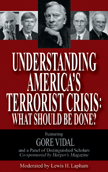The Independent Institute
VHS, 106 min., $18.95
This forum was sponsored by the Independent Institute and Harper’s magazine in April 2002, almost a year before the Iraq invasion. In a sign of how little has been resolved since, the subject matter remains fresh.
 David Theroux, founder and president of the Independent Institute, opens the forum with a summary of issues related to Bush’s crusade: the axis of evil, Osama bin Laden’s escape, the escalating Palestinian crisis, reckless government spending, attacks on civil liberties, war profiteering, etc. Theroux uses a quote from James Madison to introduce a key concept: the domestic fallout of interventionist foreign policy.
David Theroux, founder and president of the Independent Institute, opens the forum with a summary of issues related to Bush’s crusade: the axis of evil, Osama bin Laden’s escape, the escalating Palestinian crisis, reckless government spending, attacks on civil liberties, war profiteering, etc. Theroux uses a quote from James Madison to introduce a key concept: the domestic fallout of interventionist foreign policy.
“Of all the enemies of public liberty, war is perhaps the most to be dreaded, because it comprises and develops the germ of every other. War is the parent of armies. From these proceed debts and taxes. And armies, debts and taxes are the known instruments for bringing the many under the dominion of the few. . . . No nation could preserve its freedom in the midst of continual warfare.”
The bulk of the video is a discussion between Harper’s editor Lewis Lapham and author Gore Vidal. This is followed by statements from historian Barton Bernstein, economist and historian Robert Higgs, and Hoover Institution fellow Thomas Gale Moore. Theroux describes the Institute’s mission as moving beyond simplistic notions of right and left, and with a panel that runs from the ultra-liberal Lapham to the libertarian Higgs and conservative Moore, it certainly succeeds at that. At times, however, the forum’s general accord on U.S. foreign policy seems somewhat strained by its differences in other areas, primarily economics. The Bay Area audience, for instance, sounds far more receptive to Vidal’s call for higher corporate taxes than it is to Higgs’ plea for free trade. One wonders whether right-leaning viewers might be too turned off by such ancillary points to listen to the larger case against empire.
That said, the conversation is lively, engaging, and ideal for viewing in groups, where it could stimulate the sort of debates we never have in public. Vidal, for instance, exudes charm and wit even when he’s wrong, as when he suggests (à la Michael Moore) that the U.S. should have attacked the Saudis instead of the Taliban. He has a point about the Taliban, to be sure, but I imagine Antiwar.com readers can think of a few reasons not to bomb the land of Mecca and Medina.
Most of Vidal’s commentary revolves around his excellent Perpetual War for Perpetual Peace (02). Despite his obvious contempt for George W. Bush and relative fondness for Bill Clinton, Vidal always bashes empire and militarism, no matter who is behind it. He even reminds the audience of FDR’s provocations of Japan that led to Pearl Harbor – a most taboo topic, especially on the left, especially post-Private Ryan. Understandably, his treatment of that topic is less compelling in this casual setting than in his novel The Golden Age (00), just as his quick takes on Timothy McVeigh and corporate statism fall short of the essays in Perpetual War. Viewers unacquainted with these works may be puzzled by Vidal’s train of thought on occasion, but they won’t doubt his devotion to republicanism.
The expanded panel discussion that heralds the program’s end has something for peaceniks of all inclinations. Barton Bernstein puts the Sept. 11 atrocities in the context of decades of U.S. military interventions, not to excuse or diminish them in any way, but to raise a moral question. What, he asks, is the difference between terrorism perpetrated by private groups and that done by states? His conclusion will shock many viewers – and it is all the more valuable for that. Robert Higgs tackles several illusions about “national defense,” issuing a few correctives to leftist bromides along the way. Finally, Thomas Gale Moore challenges the feasibility of a war on terror and argues for U.S. military disengagement.
The conversation wanders and drags a bit during the audience Q&A, but this film will surely enliven your next class, discussion group, or – if you’re bold – family gathering.



